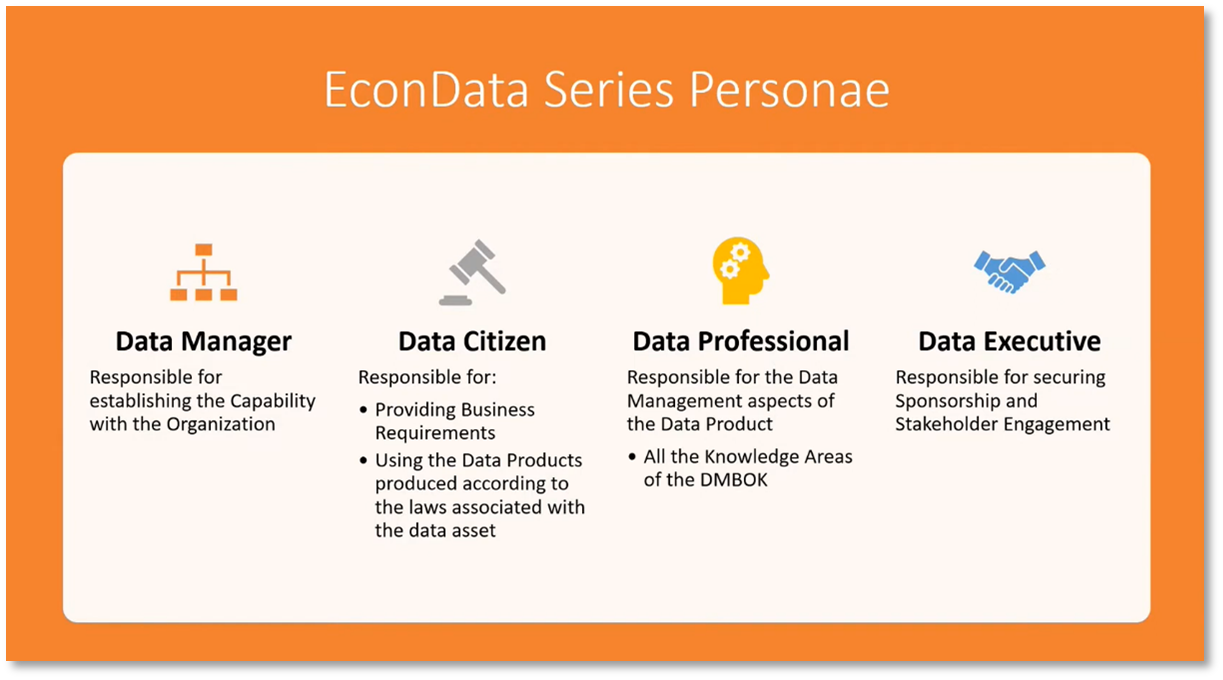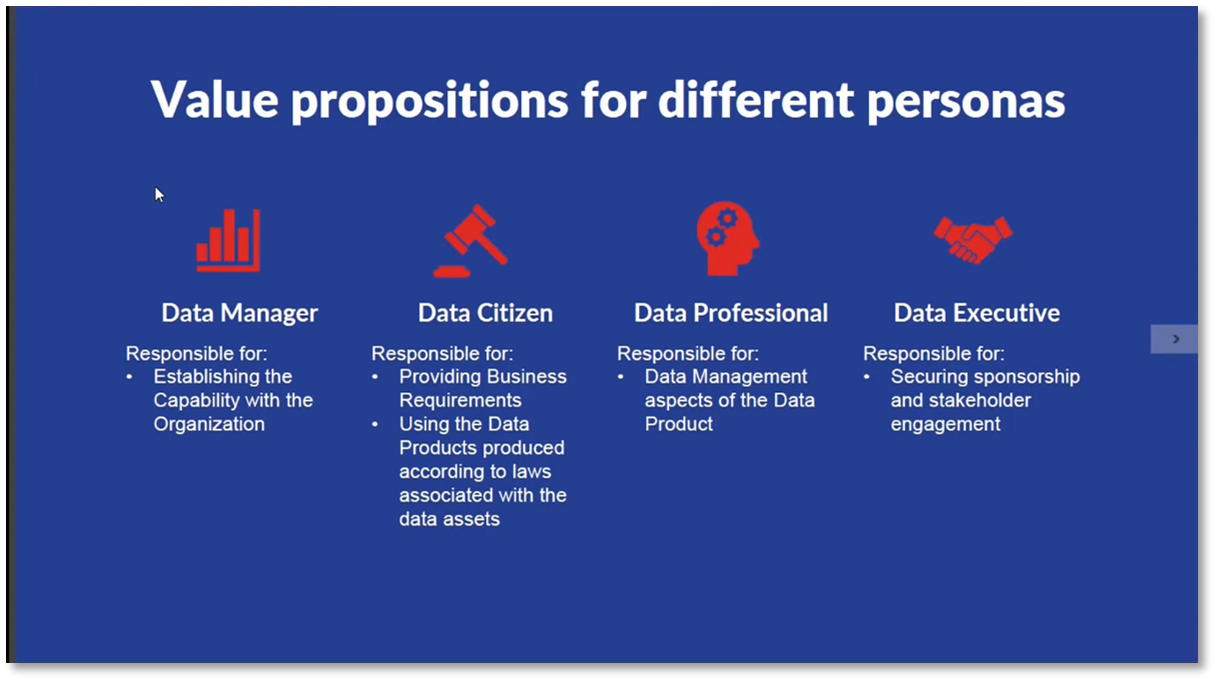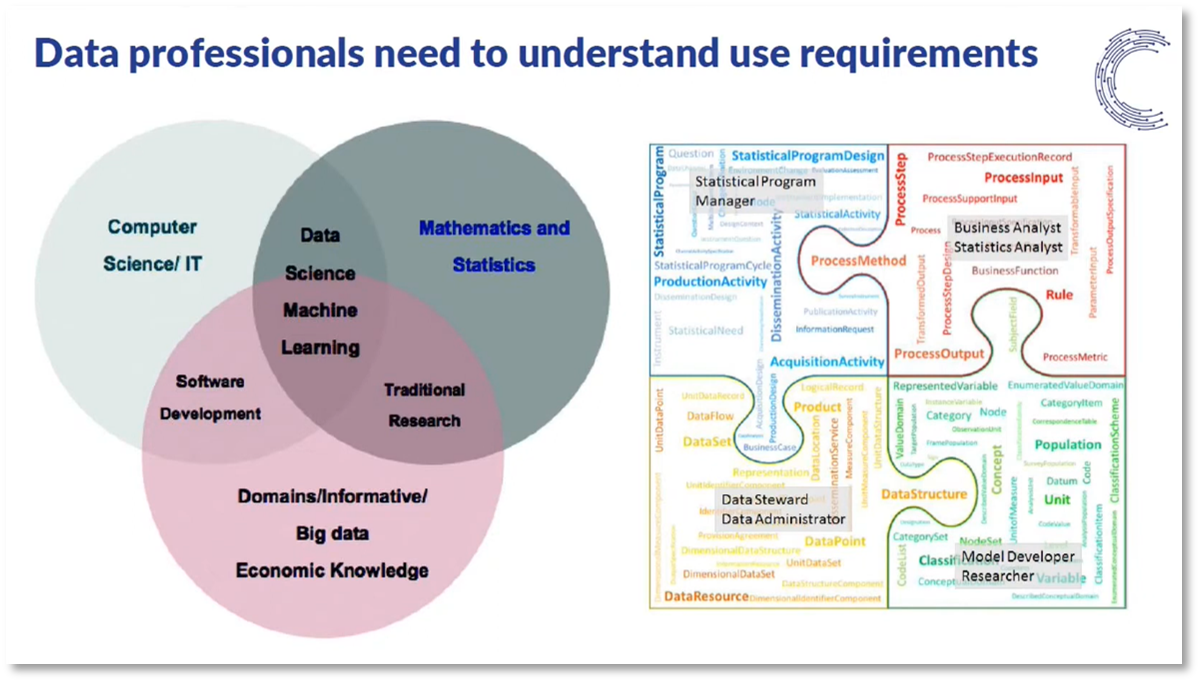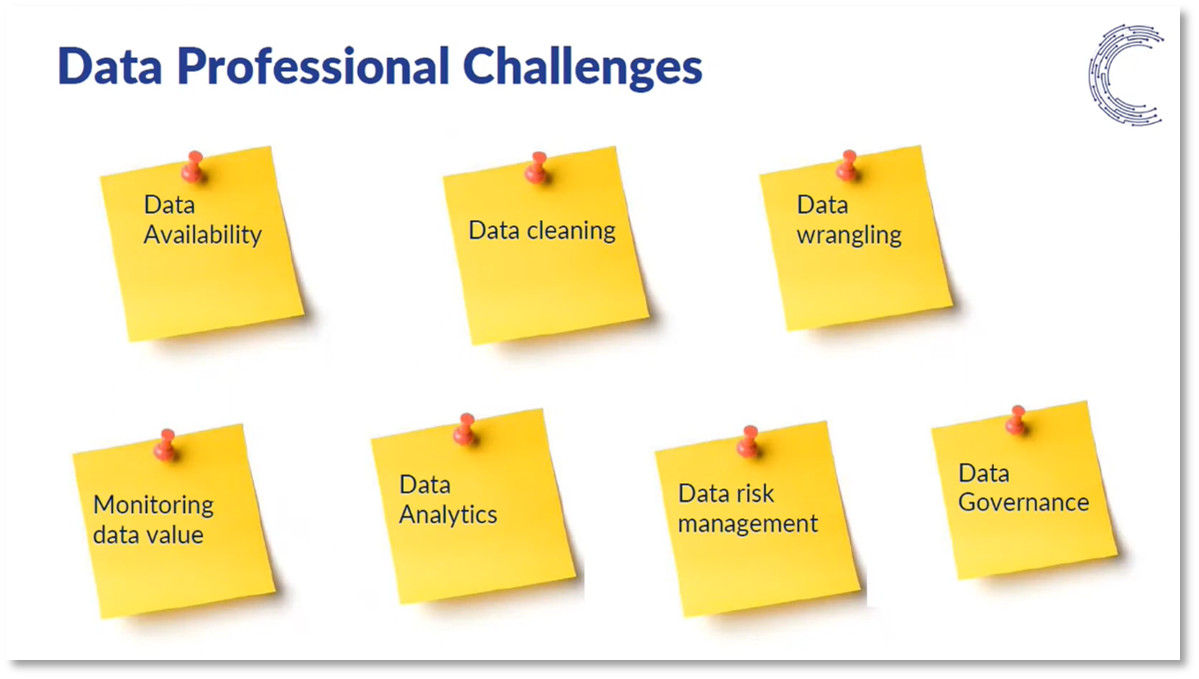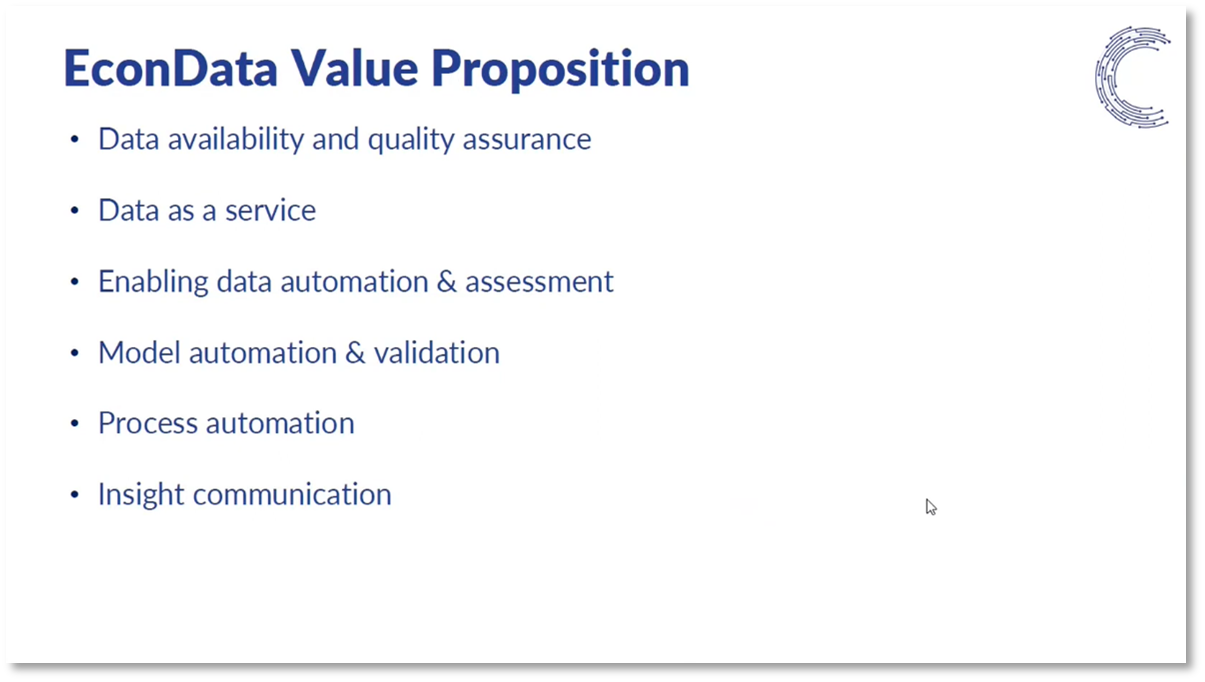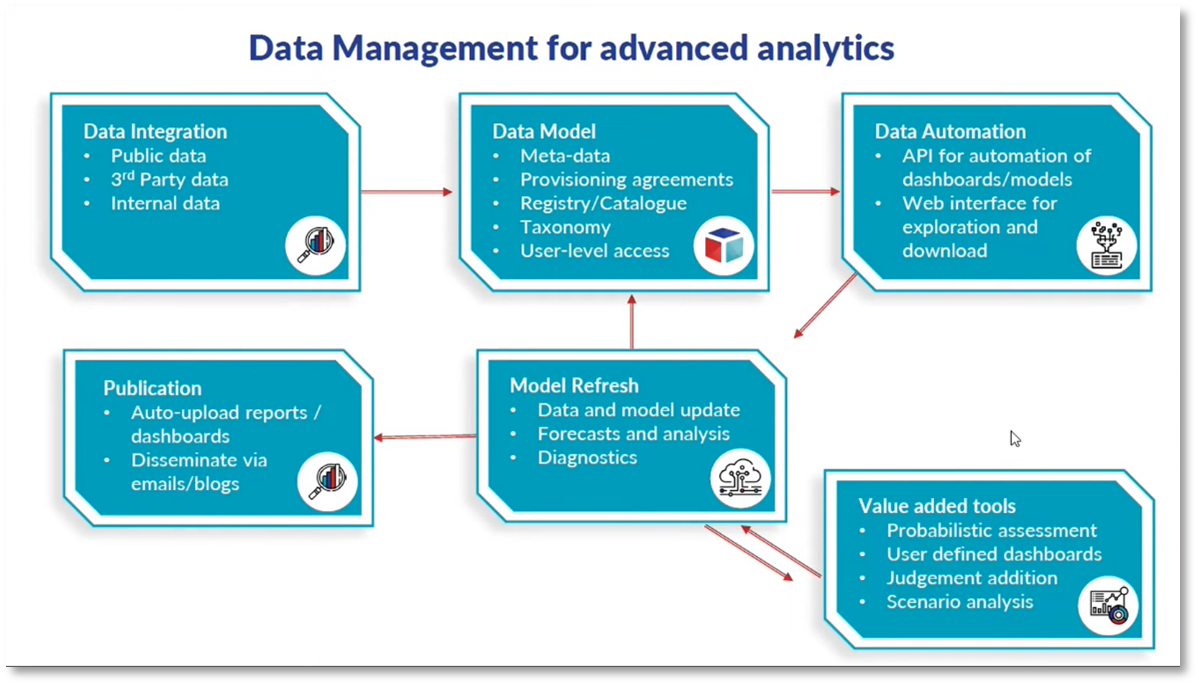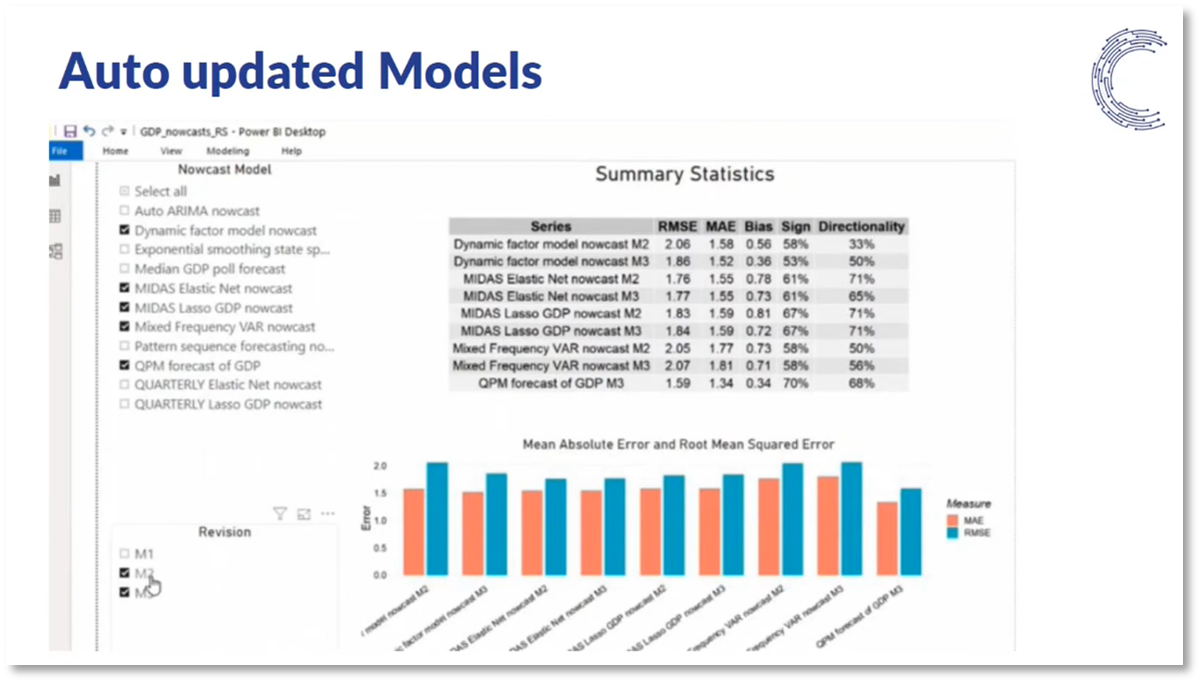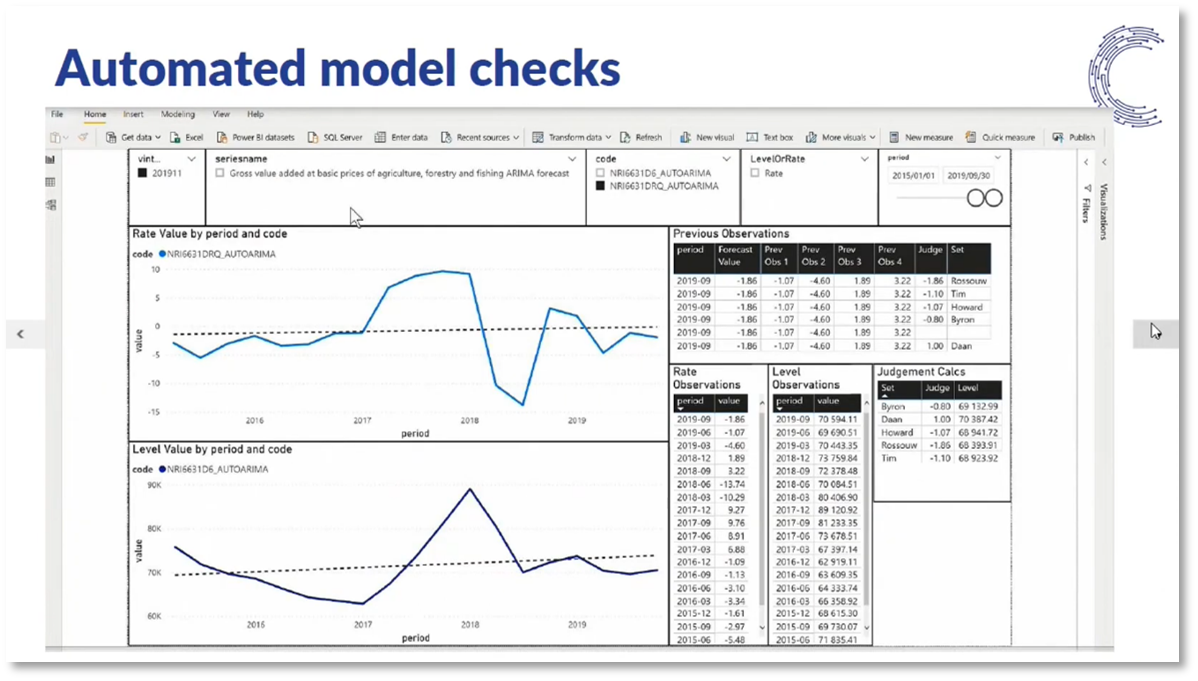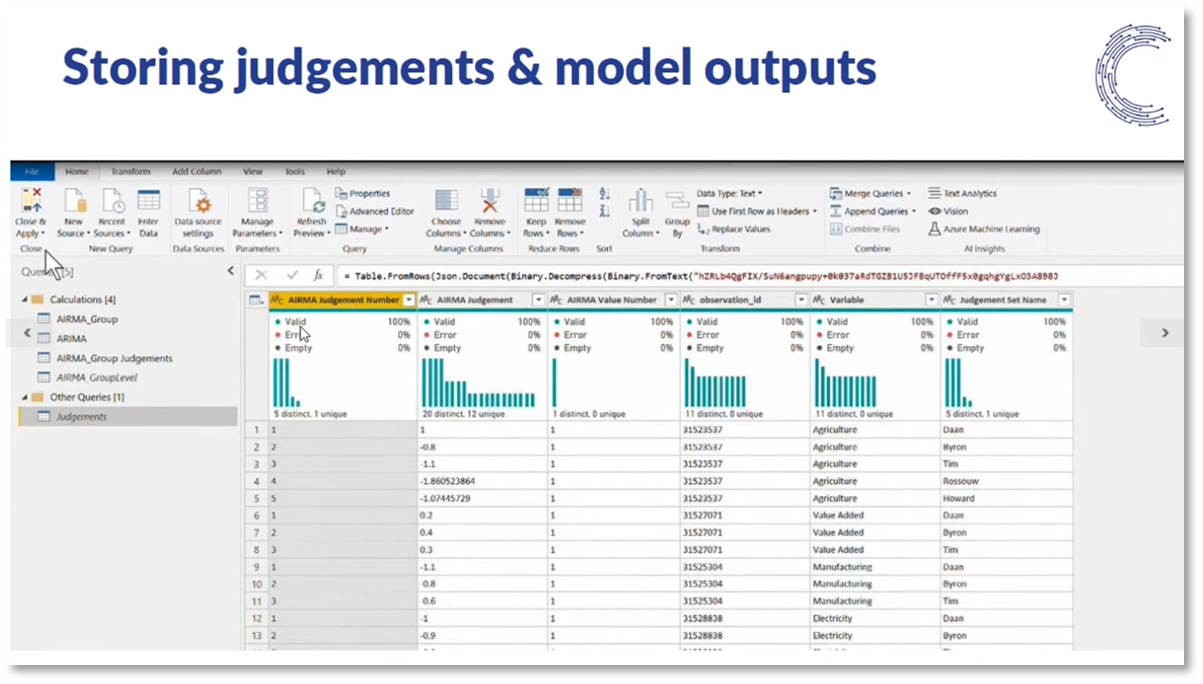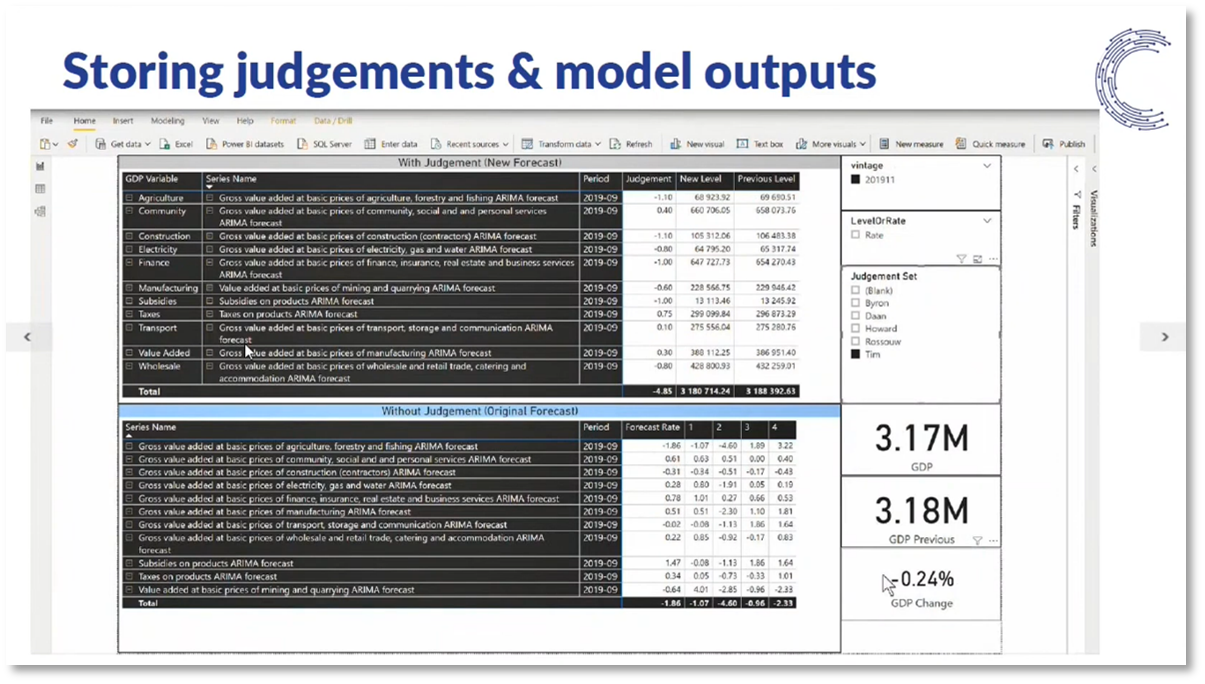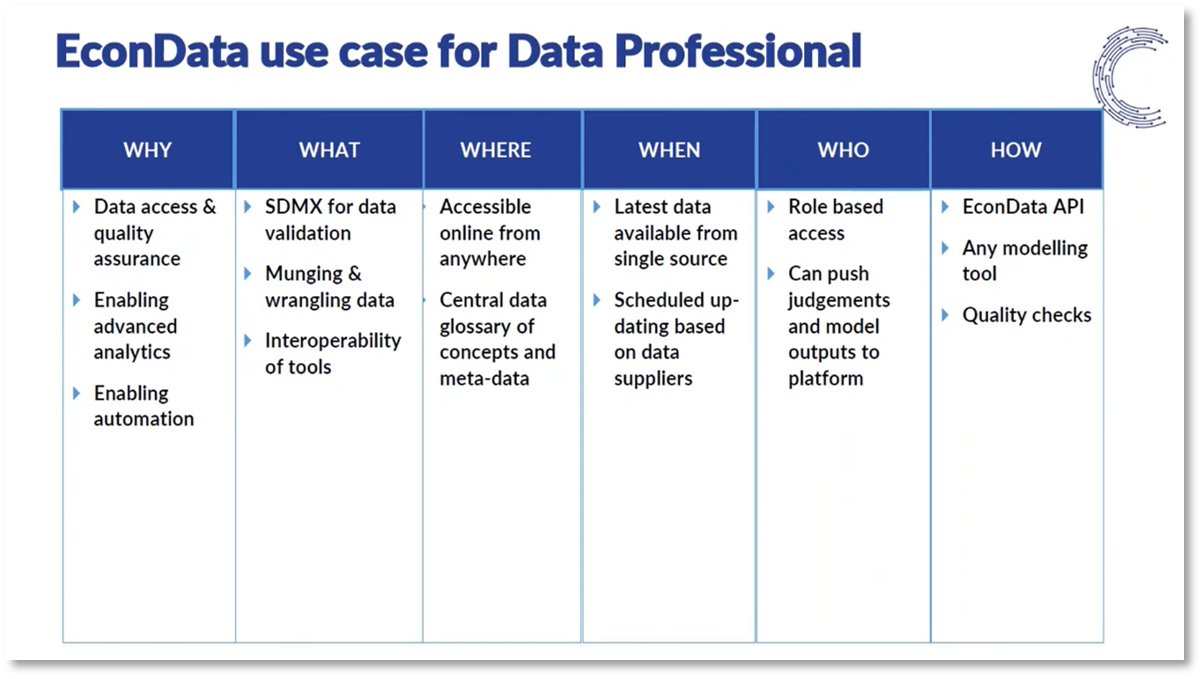EconData for Data Management Professional
Executive Summary
This webinar outlines the critical roles and challenges faced by data professionals, including data scientists and managers, in the evolving landscape of data analytics. Dr. Daan Steenkamp emphasizes the necessity of unifying data for effective decision-making and highlights the development of the EconData Platform for automating analytical models. Key themes include the importance of detailed metadata, multi-model comparisons, and robust data management and visualization in producing accurate economic forecasts. Additionally, Dr. Steenkamp addresses the need for managing data and model governance, mitigating bias in data sampling, and the advantages of utilizing the SDMX Information Model. Ultimately, this webinar underscores the value of advanced analytics in driving productivity improvements and fostering collaboration in the business environment.
Webinar Details
Title: Econ Data for Data Management Professionals
Date: 06 June 2023
Presenter: Daan Steenkamp
Meetup Group: Data Professionals
Write-up Author: Howard Diesel
Contents
Different Perspectives on Data Professionals
The Evolving Roles of Data Scientists and Data Managers
Challenges Faced by Data Professionals in Making Data Available
The Importance of Unifying Data for Effective Decision-Making
Development of the EconData Platform for Automated Analytical Models
Streamlining Data Management for Advanced Analytics
Productivity Improvement and Value Proposition of the New Way of Working
The Importance of Data Professionals in Advanced Analytics
The Importance of Detailed Metadata and Multi-Modelling in Data Analytics
The Importance of Monitoring and Comparing Multiple Models in a Production Environment
The Importance of Economic Models and Data Assessment
The Importance of Data Management and Visualisation in Modelling
Value Add and Forecast Accuracy in the Context of Economic Forecasting
Advantages of Zooming in on Model Insights and Data Quality Management
The Value Proposition of Econ Data and the Advantages of Using the SDMX Information Model
Bias in Data Sampling and Model Assessment
Managing Data and Model Governance
Insights on the challenges and benefits of advanced analytics in a collaborative environment
Different Perspectives on Data Professionals
The webinar provides an overview of data professionals and their responsibilities. It mentions a four-part series that uses econ data as a use case to discuss how to productise data. According to the European Commission, data professionals collect, store, manage, analyse, interpret, and visualise data. There is a debate about how data professionals relate to data citizens, with some focusing on collection, storage, and management while others work on the development or data science side. Regardless of specific responsibilities, data professionals should understand user requirements and how data will be used to perform their functions effectively. Most data professionals are engineering types with experience in BI, but they may also operate in different roles, such as data analysis or modelling.
Figure 1 EconData Series Personae
Figure 2 Value propositions for different personas
The Evolving Roles of Data Scientists and Data Managers
Daan discusses the complexities of roles and responsibilities in data management. He cites Byron as someone who can wear different hats in the field, highlighting the blurring of roles in big institutions due to advanced analytics. Data scientists must learn data management due to the data wrangling they do, but it is challenging for one person to encompass the entire range of data management responsibilities. It takes a 20-year career in data management to evolve from technical skills to storytelling and securing funding. The organisation's size affects the scope of responsibilities for the data management team, and some team members prefer to specialise while others are comfortable handling various tasks. The team's ability to work well together determines how tasks are divided, and considerations like project continuity and leave coverage are crucial for the overall team's success. Ultimately, the approach to roles and responsibilities in data management is a collaborative team effort.
Figure 3 Data professionals need to understand use requirements.
Challenges Faced by Data Professionals in Making Data Available
The webinar covers the ongoing debate on the domain knowledge that data professionals require, as well as the adoption of techniques from computer science and other domains by economists. It also highlights the need for computer scientists to understand business analytics and models and the optimisation of processes in a big data context for data as a product and data as a service. Additionally, it emphasises the importance of understanding the overall data value chain and how to connect silos while addressing the challenges faced by data professionals in making data available in the right form and quality for users.
The Importance of Unifying Data for Effective Decision-Making
In data management, it's crucial to understand the right approaches to cleaning and unifying data from different structures and sources. This optimisation is essential for different types of analytics. Moving towards a framework of data-as-a-service requires creating a data-driven environment that provides the right information for effective decision-making. To make this happen, data professionals must work with others in an institution to tackle the problems associated with data as a service.
Rock-solid reporting data models and the right way of interacting on use cases are necessary to answer questions in a way that decision-makers need. Codera, a data management company, has adopted work practices and technologies from other domains to develop data management tools that solve these challenges. Specific examples of how Codera's tools solve data management challenges will be presented, highlighting the considerations important for data professionals in serving their clients.
Lastly, the genesis of EconData and its role in value creation from data will be discussed, providing valuable insights for data management professionals.
Figure 4 Data Professional Challenges
Figure 5 EconData Value Proposition
Figure 6 Data Management for advanced analytics
Development of the EconData Platform for Automated Analytical Models
The EconData Platform is a powerful tool that automates analytical models and facilitates easy iteration through different versions. It allows interaction with the donor management system and enables collaborative work on the same or related models. Automation processes were implemented to effectively manage data from various sources, ensuring a governance process for model development. The platform provides up-to-date data to specific forecasting solutions and models, integrating data from public, third-party, client, and proprietary sources into a unified format for modelling purposes. The Statistical Data and Metadata Exchange (SDMX) data information model is used for integrating data from different sources. The platform's key features include data management, data governance, and the ability to compare model results and assess applied judgments over time. The platform allows for assessing data used and judgments applied during a specific model and enables flexibility in applying different models to historical data for evaluation purposes.
Streamlining Data Management for Advanced Analytics
Advanced analytics can be simplified by implementing the right process and data management solution. However, off-the-shelf solutions may not meet the requirements of data professionals. EconData is a simple data management approach that can be enhanced with additional technologies for added functionality. One of its key features is automating reporting, including the distribution of reports generated from models. Executives can gain valuable business insights from analytics, and understanding the value chain of data is crucial. The right infrastructure is necessary to integrate different technologies to enable advanced analytics. Improved productivity is expected, but the exact level is not specified.
Productivity Improvement and Value Proposition of the New Way of Working
This information highlights the benefits of a new way of working that enables the execution of previously impossible tasks. This approach has been adopted by leading central banks, commercial banks, and technology companies worldwide. While advanced analytics is considered a new concept, it is essentially an improvement of traditional methods. However, many institutions do not store vintage data in their data management systems, hindering learning from mistakes and model comparison. By adopting this new approach, institutions can achieve productivity gains and improve their economic performance. This productivity improvement is not a one-time increment but compounds over time, thanks to the ability to templatise work. The value proposition of this approach will be explored further in the upcoming presentation.
The Importance of Data Professionals in Advanced Analytics
Howard discusses his experience with two previous failed projects aimed at advanced analytics and emphasises the importance of successful implementation. Daan plans to showcase the capabilities of a templated way of work that allows for live updates and collaboration, using examples of running multiple models. He highlights the responsibility of data professionals in providing infrastructure and automation capabilities for advanced analytics while understanding the user's perspective and ultimate use case for the data.
Figure 7 Quality assurance – Statical assessment of data in database
The Importance of Detailed Metadata and Multi-Modelling in Data Analytics
Data professionals play a crucial role in ensuring the quality of transformations and identifying potential data issues by providing detailed metadata. Different models come with unique strengths and weaknesses, and their performance can fluctuate due to external factors or changes in the data. Therefore, comparing and analysing different models to understand their performance is crucial. Storing dynamic performance metrics at various time points is essential for data professionals. Power BI interface offers a user-friendly interface to interact with and visualise performance metrics, select different models, and compare various metrics. Real-time analysis and the ability to dynamically select metrics help data professionals understand the effects of data revisions on relative performance.
Figure 8 Auto updated Models
The Importance of Monitoring and Comparing Multiple Models in a Production Environment
When it comes to managing data, it is crucial to remember the relationship between the ultimate use of data and the features of a data management system, as well as analytics and visualisation software. Functionalities need to be enabled to ensure information can be audited and used for learning purposes. It is also important to continually monitor models in production to detect errors and incorrect suggestions. A feedback loop is necessary to obtain ethical truth from outside sources. Multiple models should be used and continually compared to prevent sticking to a single model that may go out of kilter. However, keeping multiple models in a production environment requires ongoing monitoring and decision-making based on various suggestions and understanding.
The Importance of Economic Models and Data Assessment
Economic models apply in various contexts, such as economics, data science, and data wrangling. Appropriate metrics and transformations are used to assess the quality of models and data. Time series and vintage data can be complex but effectively summarised in user-friendly reports. Users do not necessarily need to understand the inner workings of the models, but they can interact with and extract relevant information. Depending on user preferences, different software tools, such as Power BI or Python, can be used for assessments. Interactive reporting enables users to process, model, and forecast economic data effectively.
Figure 9 Automated model checks
The Importance of Data Management and Visualization in Modelling
The webinar highlights the importance of using a common format for data management to enable other tools to use it. It emphasises the need to focus on specific models to analyse judgments and raw data and the role of a data steward or data manager in ensuring the right data and transformations are applied in modelling. Daan also stresses the necessity to store all components of the modelling process for auditing purposes and the availability of various tools to tap into the data management infrastructure to make it user-friendly. He underlines the ability to provide rich analytics and visually appealing graphs for different types of users. Additionally, Daan emphasises the importance of data lineage and understanding the story behind the judgments applied.
Figure 10 Storing judgements & model outputs
Figure 11 Storing judgements & model outputs continued
Value Add and Forecast Accuracy in the Context of Economic Forecasting
Selecting the right tools for a project based on the client's requirements is crucial. Byron suggests using "shiny" for lightweight projects and a full set of web development tools for more high-quality products. Daan explains the concept of value add in economic forecasting, emphasising the need for real-time monitoring and measuring model performance. This allows for comparing forecasts from different models and external forecasters, providing decision-makers with high-quality and accurate forecasts. Finally, Daan highlights the benefits of drilling down into each model's results and storytelling abilities, which enables a deeper understanding of the driving factors behind enhanced forecast performance. This allows for creating compelling stories based on each model's insights.
Advantages of Zooming in on Model Insights and Data Quality Management
Storing and auditing data for informed decision-making is crucial. Zooming in on model insights and using data quality dashboards can help users make reliable decisions based on accurate data. Establishing quality thresholds and forecasting business outcomes can prevent risky decision-making and improve accountability. Choosing the best option and recording it can increase transparency, benefiting data scientists and improving the quality of work in the data value chain.
The Value Proposition of Econ Data and the Advantages of Using the SDMX Information Model
EconData offers an array of data sources and helps ensure data quality. The key value proposition of EconData for data professionals is its ability to generate advanced analytics, enabling automation and eliminating repetitive tasks. The SDMX information model allows for detailed metadata and data lineage cataloguing, enhancing data management and security. It also offers flexible tooling options protection against technological changes and facilitates data democratisation and long-term agility. By adopting the SDMX information model, professionals can leverage existing tools and benefit from the advancements made by the larger community. In terms of governance, it is important to address biases in models to ensure fairness. To summarise, the value proposition of econ data explains the motivation for its use, what users need to know, when and where to use it, and who would benefit from its use.
Figure 12 EconData use case for Data Professionals
Bias in Data Sampling and Model Assessment
Data sampling for machine learning and testing can be biased, which requires careful consideration and an ethical impact assessment. In economic modelling, bias refers to the tendency of a forecast to be higher or lower and is used to assess statistical features and deviations from estimated values. Economic data can be tracked over time to make decisions based on model performance. A governance process may involve comparing values produced by multiple models and weighing them to create a single forecast in real-time. If a model has a large bias, it may be deemed unusable.
Managing Data and Model Governance
To effectively communicate complex information, consolidating multiple forecasts into one accurate one is essential. Evaluating the quality of work done becomes easier by producing statistical reports that track model changes over time. Generating error reports can help identify missing values and assess the impact of filling them on modelling outcomes. Maintaining accurate and systematic datasets requires proper data management and governance. Implementing model governance ensures the accuracy and reliability of models. When dealing with information overload, breaking down problems into smaller components and focusing on solving one problem at a time can be helpful. Leveraging open-source tools is an efficient and quick way to develop solutions.
Insights on the challenges and benefits of advanced analytics in a collaborative environment
The key points of advanced analytics are highlighted. Daan emphasises the importance of interactive and visual answers to questions, which create credibility and enable decision-making. Collaboration between domain experts is also stressed, as their overlapping expertise facilitates effective collaboration and understanding. Additionally, critical skills such as visualising the project, delving into details, and utilising necessary resources are deemed indispensable. However, many large institutions struggle with advanced analytics due to complexity and lack of collaboration. Advanced analytics requires collaboration and a holistic understanding of the project's intricacies.
If you would like to join the discussion, please visit our community platform, the Data Professional Expedition.
Additionally, if you would like to be a guest speaker on a future webinar, kindly contact Debbie (social@modelwaresystems.com)
Don’t forget to join our exciting LinkedIn and Meetup data communities not to miss out!


